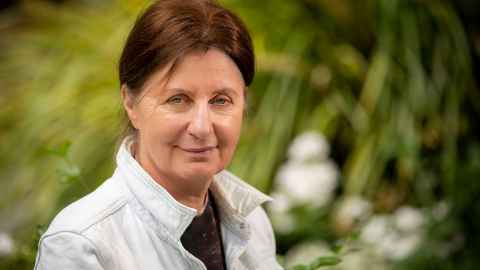Annie Goldson: Plenty to go on with
31 March 2020
Like all University of Auckland academics, Professor Annie Goldson is now having to teach online. Having experience in the multi-media world is an advantage, and Annie also has plenty to do in her downtime.

University of Auckland Professor Annie Goldson, who teaches journalism studies and two advanced documentary courses, is working on a number of projects, as well as adapting her teaching programme to be delivered online in light of COVID-19.
One documentary that has just received funding from New Zealand On Air is called Lease on Life, which is New Zealander David Downs’ story about his immunotherapy treatment for cancer.
David kept an online blog when he was diagnosed with terminal lymphoma. By chance, a US doctor stumbled upon his entries and was impressed with their humour and integrity. The doctor “made some calls” and David ended up being part of an immunotherapy drug trial known as Car-T at Massachusetts General Hospital. Earlier this year, David announced he was cured.
Annie had already done a number of the interviews before the COVID-19 lockdown.
“The science of David’s treatment is so interesting,” says Annie, who has a BSc. “It’s not my usual thing, but I just feel at the moment in this era of fake everything, and the undermining of knowledge and expertise, it’s really important to recognise innovative science. It’s a good news story when everything else is so grim.”
Peter Ellis, posthumously, may have been responsible for introducing genuine biculturalism into our highest court.
Annie has also just completed production on Red Mole, funded by a University of Auckland FRDF grant. It explores the history of the avant-garde Kiwi theatre troupe through the daughter of its two principal members, both of whom have passed away.
As well, she’s making a 10-part podcast with RNZ, with local producer Alex Behse. Called Conviction, it’s about the Peter Ellis case.
“Since Peter Ellis died, his appeal has been tangled up in the Supreme Court deciding if it would hear the case of somebody who had passed away. Peter’s lawyers said, ‘this is important. We believe it’s a miscarriage of justice’. The Crown argued Peter was found guilty in a court of law, and two appeals had upheld the original decision.
“What’s fascinating is Supreme Court Justices Joe Williams and Susan Glazebrook saying tikanga Māori needed to be considered. They said the māna of our tupuna, all those who have gone before, is as important as the māna of the living.
“So Peter, posthumously, may have been responsible for introducing genuine biculturalism into our highest court.”
This article first appeared in April 2020 UniNews. See the whole magazine here.